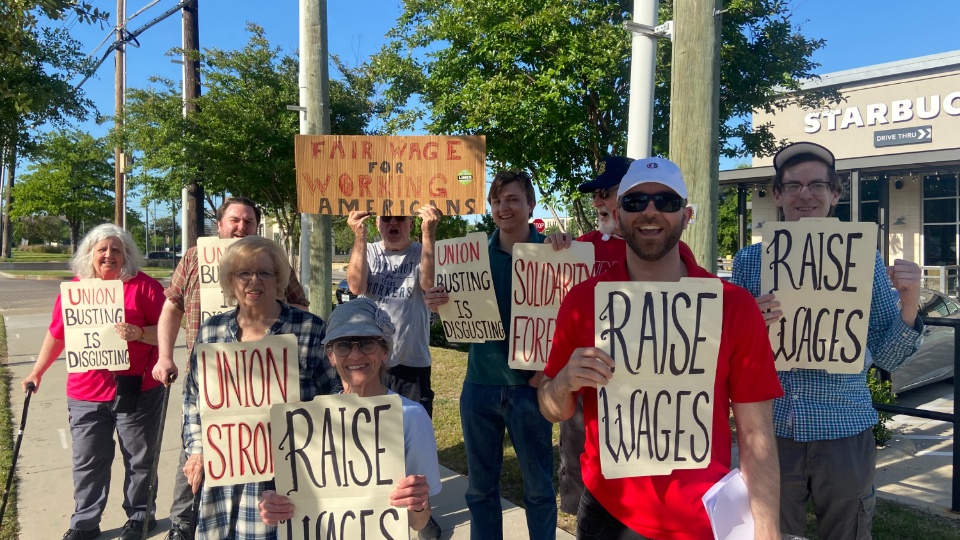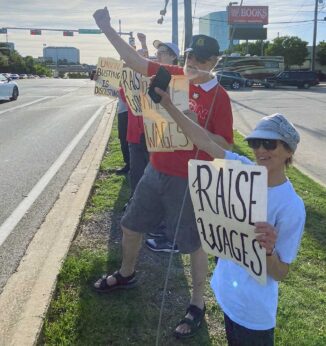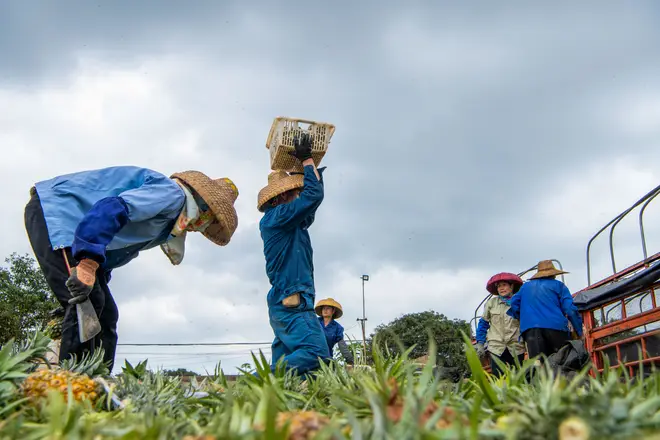Striking Hollywood writers prepared for lengthy battle with studios
- Tim Baysinger, author of Axios Pro: Media Deals
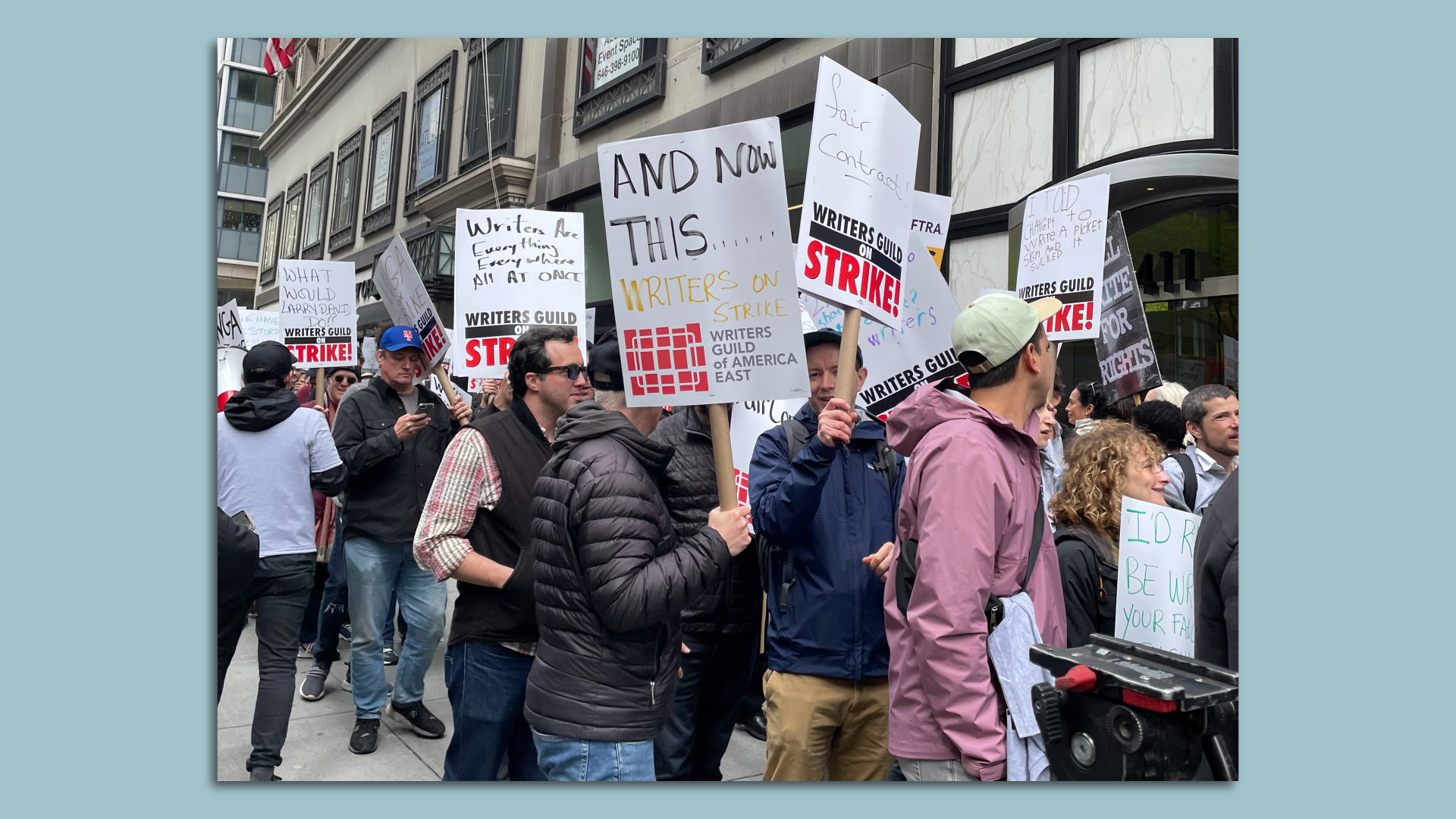
WGA members picketing outside of Peacock's NewFront in Manhattan. Photo: Tim Baysinger/Axios
Writers were galvanized Tuesday across New York and Los Angeles on the first day of the Writers Guild of America's strike against Hollywood studios.
Why it matters: WGA members appear ready for the long labor fight ahead of them.
State of play: In New York, the WGA took up the entire block outside of Peacock's NewFront advertiser event in midtown Manhattan
- Scored by chants, megaphones, drums and supportive horn honking from drivers, picketers forced advertisers — and journalists covering the NewFront — to walk around them as they entered Center415.
Context: This is Hollywood's first major work stoppage in 15 years, threatening to upend its comeback from pandemic-induced shutdowns.
What they're saying: "People are really energized. And it's not because they want to be on strike," Josh Gondelman, a longtime late-night TV writer whose credits include "Desus & Mero" and "Last Week Tonight," told Axios.
- "Everybody knows this is a fight worth fighting for — the existential future of television, film and streaming writing as a career," he said.
- Dave Sirus, a writer on "Bupkis" — one of Peacock's prized new shows that it was touting to advertisers on Tuesday — was also outside picketing.
- "Everyone here wants to work," he said. "We all really wanted them to be able to negotiate, but what other choice do we have?"
Zoom out: The strike began Tuesday morning after the WGA's current labor deal with the studios expired. The two sides appear to be far apart on a new contract.
- The streaming era has upended traditional Hollywood business practices, and writers feel they've been left out of the "peak TV" content boom.
- Streaming services dominating the TV landscape are ordering fewer episodes per season and ending shows earlier than their broadcast and cable forefathers.
- Additionally, residuals for streaming shows are far less than what writers would get from TV syndication deals.
Plus, the rapid growth of AI has writers concerned studios will look to replace some of their work with machines.
- "There's been such a sea change in the way the work that we do is distributed," said Gondelman.
- "And I think that corporations have seized upon that as a chance to take profits. They're trying to turn writing into an unstable gig economy type job."
The other side: The Alliance of Motion Picture and Television Producers, which represents the major studios and production companies, has argued its most recent proposal included "generous increases in compensation" and increases in streaming residuals.
- The alliance added that it was prepared to improve that offer.
- "The AMPTP member companies remain united in their desire to reach a deal that is mutually beneficial to writers and the health and longevity of the industry, and to avoid hardship to the thousands of employees who depend upon the industry for their livelihoods," the alliance said in a statement after talks broke down Monday night.
The intrigue: Compared to the 2007-2008 strike, which lasted for 100 days, the WGA has formed a more united front with fellow Hollywood guilds like the Director's Guild of America and SAG-AFTRA, which represents the actors.
- Both guilds' labor deals with the studios expire at the end of June. In 2008, the DGA cut its own labor deal that may have undercut the WGA's stance.
- Members of the DGA and SAG-AFTRA, as well as the International Alliance of Theatrical Stage Employees — representing 168,000-plus below-the-line industry crew members — joined in the picketing on Tuesday.
- Sirus praised the support, noting: "We saw 15 years ago what happens when you try to work around writers. And I don't think anyone wants that."
What's next: WGA has picketing planned for at least the next two weeks in both cities, including outside of Netflix's New York offices Wednesday afternoon.
- "Whatever it takes to keep the membership galvanized, keep the pressure on," says Lisa Kron, a longtime playwright and writer on HBO's "Somebody Somewhere."
- As for how long the strike will last? "It's not up to us. It's up to the studios," she says.
Hollywood writers go on strike
- Tim Baysinger, author of Axios Pro: Media Deals
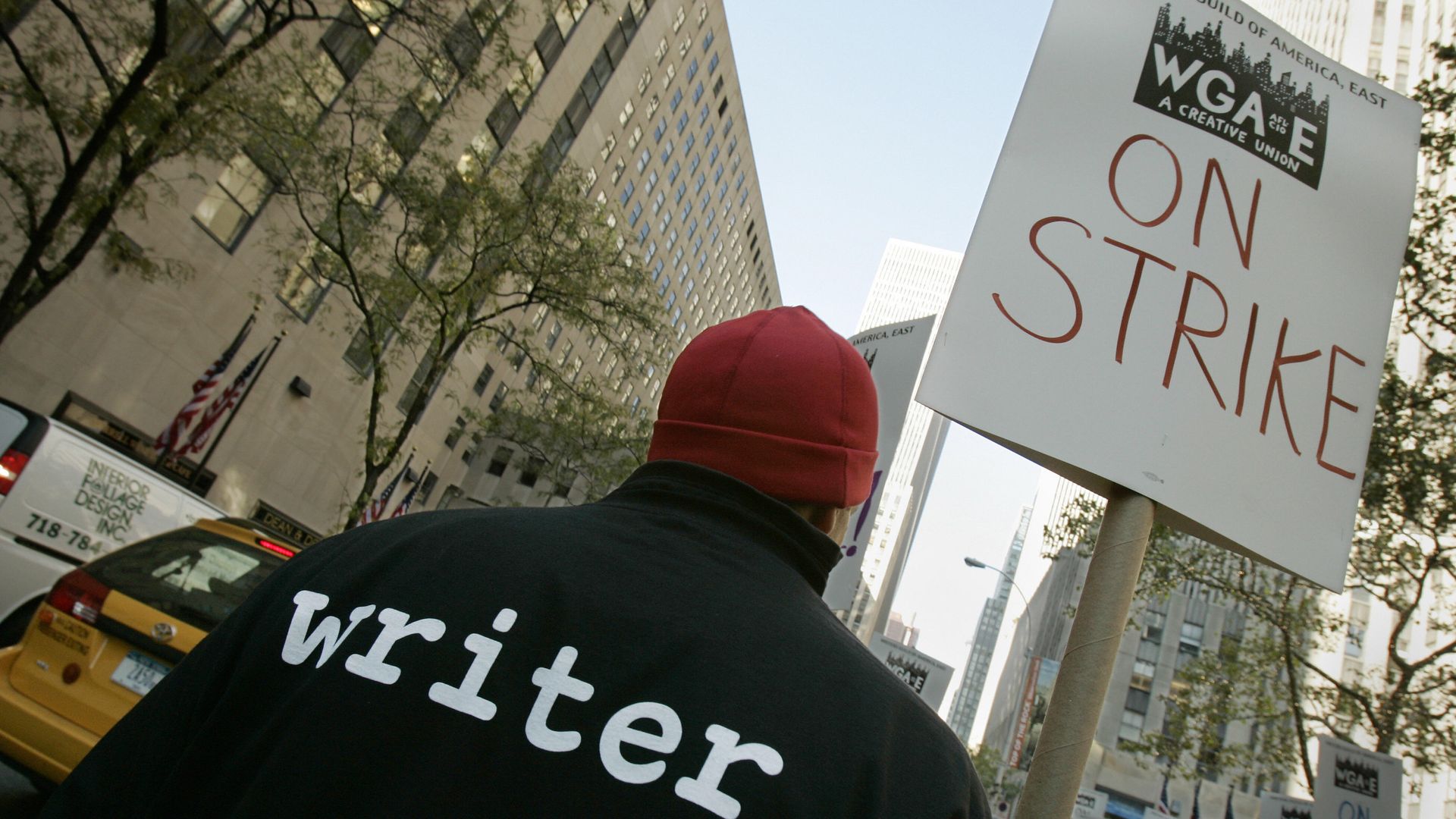
A WGA member during the writers' strike in 2007-08. Photo: Stan Honda/AFP via Getty Images
The Writers Guild of America is on strike for the first time in 15 years after negotiations for a labor deal with Hollywood studios broke down ahead of the current deal's expiration on Monday.
Why it matters: A work stoppage threatens to cripple Hollywood's already-messy transition to the streaming era.
Details: The strike began Tuesday morning, and writers will start picketing outside studios and media companies' offices later on Tuesday.
- During the strike, all WGA members are barred from performing writing duties for any of the struck companies, though they may perform other work like producing or directing.
- Given the time of year, most broadcast shows will be in-between seasons. But a strike going deep into the summer would lead to delays for the 2023-24 season.
- Late-night shows such as NBC's "The Tonight Show" and CBS' "The Late Show" will immediately go dark. Daytime soap operas are expected to halt production as well.
- Streaming services and film studios are less affected initially because they produce their content well in advance.
The big picture: The streaming era has upended traditional Hollywood business practices, and writers feel they've been left out of the "peak TV" content boom.
- Streaming services that have dominated the TV landscape are ordering fewer episodes per season and ending shows earlier than their broadcast and cable TV forefathers. Additionally, residuals for streaming shows are far less than what writers would get from TV syndication deals.
- The rapid growth of AI is causing concern among writers that studios will look to replace some of their work with machines.
- "The companies' behavior has created a gig economy inside a union workforce, and their immovable stance in this negotiation has betrayed a commitment to further devaluing the profession of writing," the WGA said in a statement Monday night.
The other side: The Alliance of Motion Picture and Television Producers, which represents the major studios and production companies, argued that its latest proposal included "generous increases in compensation" and increases in streaming residuals — and added that it was prepared to improve that offer.
- "The AMPTP member companies remain united in their desire to reach a deal that is mutually beneficial to writers and the health and longevity of the industry, and to avoid hardship to the thousands of employees who depend upon the industry for their livelihoods," the AMPTP said in its own statement.
Of note: The strike comes ahead of upfront presentations to advertisers for many of the top media companies like Comcast, Disney and Warner Bros. Discovery.
Flashback: The last WGA strike came in 2007-08 and lasted for 100 days.
What's next: This is just the beginning: The studios' labor contracts with the Directors Guild of America (DGA) and SAG-AFTRA, which represents the actors, both expire at the end of June.
- Both the DGA and SAG-AFTRA have voiced support for the WGA, but will continue working during the WGA strike.
- The DGA will begin negotiations on May 10, while SAG-AFTRA is slated to start its talks in early June.
Go deeper:
AI stars in Hollywood labor negotiations
- Ina Fried, author of Axios Login

Illustration: Gabriella Turrisi/Axios
AI has emerged as a key issue as screenwriters seek to iron out a new contract with Hollywood producers. As The New York Times reports, it's a concern also held by actors and others who worry that the work they do will get replaced by AI output.
The big picture: Artificial intelligence, particularly new generative technologies, present a range of opportunities and threats to the way that movies and TV shows are made, along with other creative works, such as audiobooks.
Driving the news: In its contract negotiations, the Writers Guild aims to limit the use of AI-generated dialogue or scenes. But there's a wide array of other ways that AI is likely to disrupt Hollywood.
- AI could allow popular actors to "speak" any number of foreign languages, for example. That might be more appealing to global audiences, but also threatens the livelihoods of the actors who have made careers out of dubbing, say, American movies into German.
- Similar technology is threatening to upend the audiobook industry as well, with AI narrators quickly improving — and sometimes being trained on the human book readers they stand to replace.
- There's also the concern that the same technology that allows deepfakes could be used to erode actors' control over their own likeness, giving studios the ability to generate new performances from an actor, living or dead, potentially without full consent or compensation.
- And the concerns don't end there. Generative AI threatens to upend the special effects industry, which has been dominated by the likes of Industrial Light & Magic. Even individual costumers could be at risk, as AI might be used to place digital outfits on actors — an option that could give studios both cost savings and added flexibility.
